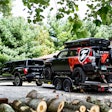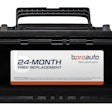Renewable diesel, which is also known as synthetic diesel and HPR (high performance renewable) diesel, is continuing to generate market interest.
Hard Working Trucks recently interviewed Propel Fuels’ Director of Marketing Chris LaPlante about the alternative fuel.
There are 34 public Propel stations listed on the company’s website: 33 are in California and one is located in Seattle, Wash. The Sacramento-based company’s branded Diesel HPR is produced by Neste, the nation’s largest supplier of renewable diesel. Propel also sells E85 ethanol.
Propel offers fleet incentives, such as a volume rebate of up to 5 cents a gallon. Also, its patented CleanDrive reporting system will track and report a fleet’s low-emissions fuel program.
On its website, Propel states that its “75 cetane rating is 40 percent higher than regular diesel, for smoother combustion and a better ride.
“Diesel HPR combusts more efficiently, which means more power and torque for your rig. And unlike biodiesel, Diesel HPR provides uncompromised cold weather performance.
“Diesel HPR is additized to provide excellent lubricity in all driving conditions and exceeds ULSD lubricity specification.”
One gallon of Propel’s Diesel HP was selling for $2.49 a gallon in Oakland, Calif. on Friday. Comparatively, the lowest price available for conventional diesel in Oakland on the same day was listed at $2.47 per gallon, according to oaklandgasprices.com.
HWT: More fleets are choosing renewable diesel (RD). Why?
LaPlante: Our fleet customers are choosing to fill with Diesel HPR for several key reasons: Diesel HPR outperforms both petroleum diesel and biodiesel in performance, emissions and value. And since Diesel HPR meets the ASTM D975 diesel specification for use in diesel engines, there are no barriers to usage.
Specific to performance, our fleet customers love that this fuel has a 75 cetane rating, 40% higher than regular diesel. Diesel HPR combusts more efficiently, which means more power and torque for your rig. Also, Diesel HPR is additized to provide excellent lubricity in all driving conditions and exceeds ULSD lubricity specification.
For fleets using B20 biodiesel, Diesel HPR is an all-around cleaner fuel. Diesel HPR is made from 99% renewable content, resulting in a much lower carbon profile. B20 biodiesel is 20% renewable and 80% petroleum, so it’s impact is limited by the high petroleum content. Diesel HPR provides uncompromised cold weather performance.
HWT: Have low diesel prices effected demand for RD?
LaPlante: Propel’s renewable diesel competes head to head with conventional diesel at current prices, so we’re seeing a continued strong interest in this product despite low petroleum pricing.
HWT: Will Propel be expanding soon to other viable markets?
LaPlante: California is the largest fuel market in the US. We plan to focus our attention on expanding our service network in the state of California for now.
HWT: RD availability proves to be a hurdle for some fleets that are interested in using the fuel. Why is RD not available in more markets?
LaPlante: Launching just last year, the RD market is still in its early days, and is limited to a few producers. We believe production will continue to expand, providing more availably to new markets.










